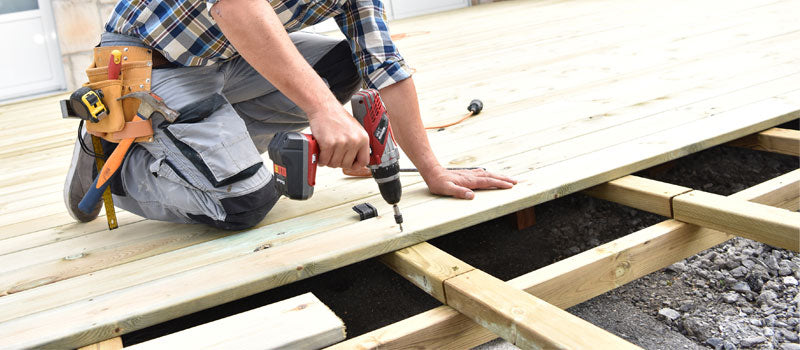
Types of Fasteners for Decking
There are many types of fasteners that can be utilized for building a deck. The fasteners you choose play an important role in the integrity of a new deck build or an upgrade. Understanding and investing in high-quality options will make a large difference in the success of your deck for years to come. Continue reading to learn more about the different types of deck fasteners and the pros and cons of each type.
Types of Deck Screws
Deck screws feature a deep sharp thread that creates a strong connection. This thread allows the screw to remain sunk into the material for the long run. As long as deck screws aren't stripped, they can be easily removed from a deck. Nails on the other hand, are more tricky to remove.
There are a few types of deck screws to accommodate the different deck boards available including wood deck screws, composite deck screws, and structural wood screws.
Wood Deck Screws
Wood deck screws are a very common fastener for deck building. They have a larger surface area than regular wood screws. Fasteners Plus offers bulk loose wood deck screws and collated wood deck screws.
It is important that the screws you choose for a deck build are corrosion-resistant. Deck screws are typically carbon steel or stainless steel. They often have a special ceramic coating that prevents rust.
- Check out this blog to learn about corrosion-resistant screws and their materials.

Composite Deck Screws
Additionally, composite deck screws are perfect for composite, capped composite, and PVC decking. They offer top-notch corrosion resistance and ease of installation. They are available in a wide range of colors to match your deck boards. Once installed, they blend right in.
Structural Wood Screws
Structural screws are an excellent option for deck construction. They are a great alternative to traditional lag screws. These construction screws can drill directly into the material without needing to drill a pilot hole first.
Structural wood screws offer a stronger connection than traditional wood screws. The head of a structural screw is typically wider than regular screws providing a larger bearing surface.
The Simpson SD connector screws and Simpson SDS connector screws install joist hangers to a deck with ease. The load values achieved by these connector screws exceed those of typical 10d and 16d common nails.
Hidden Deck Fasteners
Hidden Deck Fasteners are an alternative to screws or nails. Not only are they easy to install, but they provide a fastener-free look on your deck. Hidden deck fasteners secure deck boards from the edges of the deck boards or below. They are designed for composite deck boards but can be used for limited premium hardwoods. The downside to this option is not being able to use them for very many types of wood.
Common Hidden Deck Fastener Types:
- Screws hidden by deck plugs- The screws install into the deck and the deck plugs rest on top of the screw. The deck plug sits flush with the boards. Deck plugs are color-matching or made of your composite deck material.
- Hidden clip fasteners- These fasteners install on the edge of grooved composite deck boards.

Deckorators Stowaway hidden deck fastener is perfect for connecting deck boards to joists. They connect to the edges of grooved composite deck boards. This option includes preloaded stainless steel square drive screws.
Decking Nails
When it comes to nails, there are many styles to choose from. Stainless steel and hot dip galvanized nails are the best options to invest in for corrosion resistance. The different types of nails for deck applications include common nails, box nails, ringshank and spiral nails, finishing nails, and chasing nails.
- Common nails are typically used for general deck framing. This type of nail has a large head and a thick shank. The downside to this style is that it can be more difficult to drive into the wood and may split the wood. However, they do hold in the wood well. They are most commonly used with 2x dimensional lumber.
- Box nails have a thinner shank than common nails and reduce splitting in wood. Due to the thinner size, box nails are most suitable for thinner wood materials. They should never be used in structural deck applications. They do not have the level of strength and holding power that common nails have.
- Ringshank and spiral nails successfully grip the wood fibers. They are very difficult to remove once they are driven into the wood.
- Finishing nails are a great option for trim work. They have slender shanks and small, barrel-shaped heads that countersink into the wood.
- Casing nails are a heftier version of finishing nails and provide more holding power.

Lag Screws and Carriage Bolts
Both lag screws and carriage bolts are both excellent options for fastening large pieces of wood such as a deck post. However, there are some distinct differences between the two.
Carriage Bolts
Carriage bolts are heavy-duty fasteners that have a round head and square neck. The square neck successfully keeps the bolt locked in place once installed. Installing carriage bolts alone will not suffice. We recommend using compatible nuts and washers so the bolt doesn't sink into the wood.
Carriage bolts can be easily tightened in the future if the lumber shrinks. Once this bolt is installed, it is very challenging to remove it due to the circular head shape.
Lag Screws
Lag screws, also known as lag bolts, have extra holding power compared to many deck screws. This fastener typically has a hexagonal or square head. They are either partially threaded or fully threaded with a pointed tip like most screws.
The design of lag screws eliminates the need for nuts. The threads on the lag screw lodge into the wood creating a tight and secure hold. They can be easily tightened with a wrench. Although these are a great option for many construction applications, they are not as strong as carriage bolts.

